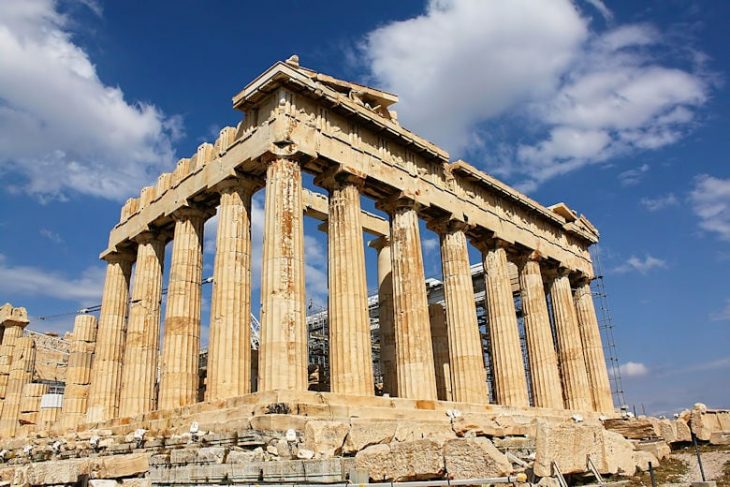Greece is one of the Mediterranean countries bordering Albania, Bulgaria, Macedonia and Turkey. Magnificent beaches, beautiful islands and lots of sun fascinate travelers as well as the exciting temples and ruins from antiquity – a great and popular travel destination.
| Capital City | Athens |
| Size | 131,957 km² |
| Resident | 11,160,000 |
| Official Language | Greek |
| Currency | Euro |
| Time Zone | UTC+2/+3 |
| Telephone Area Code | +30 |
Source: Destination Explorer
Fast facts to know
- Greece has thousands of islands, only around 100 of which are inhabited.
- According to Greek mythology, Mount Mytikas with Mount Olympus is the seat of the gods.
- Feta is a protected term and always comes from Greece.
- No point in the country is more than 137 kilometers from the coast.
- Greece is not only one of the sunniest countries in Europe, but also one of the most biodiverse.
- Athens is the oldest still inhabited city in Europe.
- Greeks like to dance. There are more than 4,000 traditional dances.
- The official name of Greece is Hellenic Republic, or Hellas for short.
- Showing someone an open hand is considered an insult.
- The name day is celebrated more than one’s own birthday.
- Germans can enter the country with a valid passport or identity card.
- Greek culture is considered to be the first high culture in Europe.
- Greeks nod their heads when saying no and shake them when saying yes.
Exciting cities in Greece
- Athens
- Thessaloniki
- Corfu
- kavala
- Monemvasia
- Rethymno
- Rhodes
- Chania
History of Greece
- 1600 BC BC Mycenaean culture.
- From the 8th century B.C. Extensive naval and military expeditions by the Hellenes.
- 5th century BC City-states in the Classic Period / Persian Wars.
- 146 BC BC The area of today’s Greece becomes a Roman province.
- 13th century Fall of the Byzantine state and disintegration into successor states such as the Kingdom of Thessaloniki.
- By the 15th century, most of Greece was conquered by the Ostman Empire.
- 1821 Greek Revolution.
- 1830 Central Greece, Peloponnese and Cyclades are declared an independent state of Greece.
- Great European powers install a monarchy in Greece from the outside.
- 1908 Crete declares union with Greece.
- 1912/1913 Macedonia falls to Greece after the Balkan Wars.
- 1st World War Greece remains largely neutral.
- 1922 End of the Greek-Turkish War with Greece clearly defeated.
- 1924 Abolition of the monarchy with the following dictatorship.
- World War II: occupied by Italy, Germany and Bulgaria, followed by civil war.
- 1952 Greece joins NATO.
- 1954 Accession to the Balkan Pact.
- 1967 military dictatorship.
- 1974 final collapse of the military dictatorship and return to democracy.
- Admitted to the EEC in 1981.
Climate & travel weather in Greece
- Mediterranean climate (hot, dry summers / mild, rainy winters).
- Inland very hot in summer, often forest fires.
- Coast: more bearable temperatures.
- Snow in the mountains in winter.
- Heavy rain between October and January.
- Recommended travel time:
- Best travel time: April-October.
- City trip: spring (summer is very hot, autumn is nice with rain).
- Winter sports: December-March.
Ideas for trips in Greece
- Acropolis & Parthenon in Athens
- Meteora monasteries in Kalambaka
- Ruins of Delphi
- Olympus (Mount Mystika)
- Ancient city of Olympia with Temple of Zeus
- Palace of the Grand Masters on Rhodes
- Santorini island
- Windmills of Mykonos
- Pink sandy beach of Elafonisi
- Ruined city of Mystras
Eating & drinking in Greece
- Mediterranean, hearty cuisine with lots of fresh vegetables.
- Lamb, aromatic cheese and garlic are popular.
- Eating together is important to the Greeks.
- Often only coffee for breakfast, and lunch only of minor importance.
- Main meal: Sumptuous dinner between 9 p.m. and 10 p.m.
- Olives and olive oil are important components of almost all dishes.
- Classic Greek salad: made from tomatoes, cucumbers, olives and onions.
- Dairy products like yogurt and cheese are very popular.
- Feta cheese made from sheep’s and goat’s milk is everywhere.
- Meat is often grilled or roasted in the oven.
- Typical spices and herbs: oregano, mint, thyme, sage, cinnamon, paprika.
- In coastal regions there is a lot of fresh fish and seafood.
- Soups, stews and casseroles are also very popular.
- In restaurants it is common for guests to be able to look into the pots.
- Bread, mostly white bread, is almost always served.
- Greek national drink is water.
- Large selection of good bottled wines.
- Aniseed brandy Oúzo very popular.
- Coffee is enjoyed throughout the day.
- Desserts mostly very sweet prepared and served.
- Typical dishes:
- tzatziki
- Gyros
- Bifteki (minced meatballs)
- Souvlaki meat skewers (with pork, also lamb or chicken).
- Pikilía (plate of various cold appetizers).
- Arnáki fassolákia (stewed lamb with green beans).
- Jourvalákia (minced beef dumplings).
- Jouvétsi (noodles baked with beef).
- Kléftiko (lamb or goat meat cooked in the oven with potatoes).
- Láchanodolmádes (cabbage leaves stuffed with rice and minced pork).
- Loukanikó (fried, usually very fatty sausage).
- Spetsofaí (smoked sausages cooked in oily tomato sauce with lots of green peppers).
- Loukanikópitta (sausages in a dressing gown).
- Márides (crispy fried anchovies).
- Arsinósalata (sea urchin salad).
- Kakavia (fish soup).
- Revithókeftedes (pancakes made from chickpea flour).
- Spanakópitta (strudel dumplings filled with spinach).
- Stifádo (beef or rabbit goulash with onions).
Particularly scenic
- Smuggler’s Bay on Zakynthos
- Vikos Gorge
- Valley of the Butterflies in Rhodes
- Kleftiko in the southwest of Milos
- Most beautiful islands:
- Crete
- Rhodes
- Santorini
- Zakynthos
- Corfu

